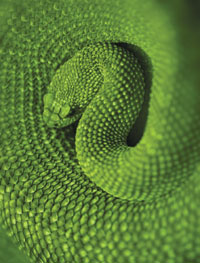The University of Texas at Tyler
Did you know....
 because snakes are asocial beings, the female snake has to emit a chemical to attract the male?
because snakes are asocial beings, the female snake has to emit a chemical to attract the male?
The fact that snakes are loners made their mating behavior an intriguing topic of research for Dr. Neil Ford, a University of Texas at Tyler biology professor who has gained international recognition for his research in herpetology, authorship of scientific papers and presentations at conferences across the globe. Dr. Ford began studying snake reproduction as an undergraduate student at the University of Kansas and much of his early research focused on pheromones, a chemical secreted by the female snake to attract the male. Dr. Ford continues to study the strategies that snakes use to control reproductive traits and hopes that the information he gains in understanding the energetic control of reproduction in snakes may be able to help other researchers.
Dr. Ford's studies determine how variation in energy intake effects snake fertility. Snakes' reproduction is strongly influenced by variation in food intake and snakes are good models for this type of study because they eat their food whole. Dr. Ford can easily measure the calories consumed, and can better regulate the food intake and see how it effects reproduction. In his research, the snakes are divided into a low caloric diet group and a high caloric diet group. Low caloric diet groups are fed the minimum amount to maintain weight to survive. High caloric diet groups are fed the maximum amount that the body can consume. This allows Dr. Ford to imitate the many conditions that exist for snakes in the wild. Interestingly, female snakes will still reproduce on the low caloric diet and will not become overweight from the overfeeding. Instead, this overfeeding allows the female to produce more or larger young, or reproduce more often in the year, depending on the species of snake. Most snakes reproduce usually just once a year, but with more food, some can reproduce several times a year.

Dr. Neil Ford
| Dr. Ford conducts his studies in the Ophidian Research Colony at UT Tyler, a snake laboratory that he made an official research lab in 1989, allowing it to become self-sustaining. The Ophidian Research Colony snake lab was established after several years of scientific research on reproduction in snakes, a result of which was a surplus of animals. The Ophidian Research Colony now supplies captive-raised snakes to other scientists around the country and these scientists explore a variety of concerns affecting humans, including spatial learning, environmental |
| toxins, retinal damage by lasers and embryological development. |
In 2001, Dr. Ford with funds from donors established the Ophidian Research Colony Endowment Fund endowment with a $10,000 gift. The endowment is invested in the LTF. Distributions from the endowments will be used to help cover some of the costs to operate the lab, which has about 400 snakes of a dozen species.